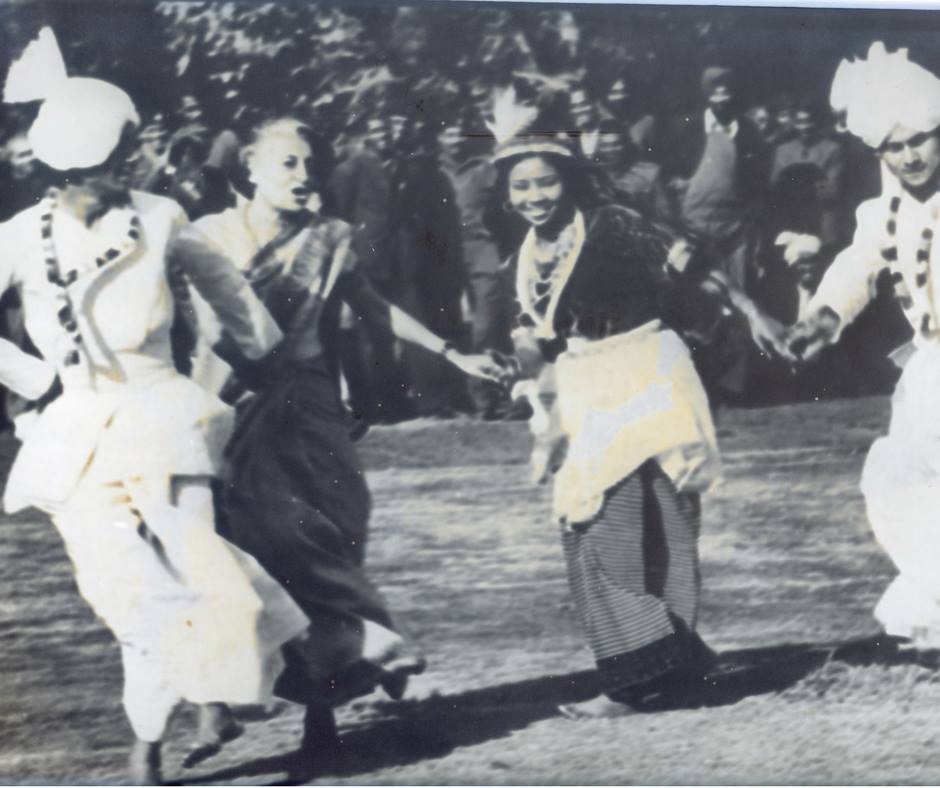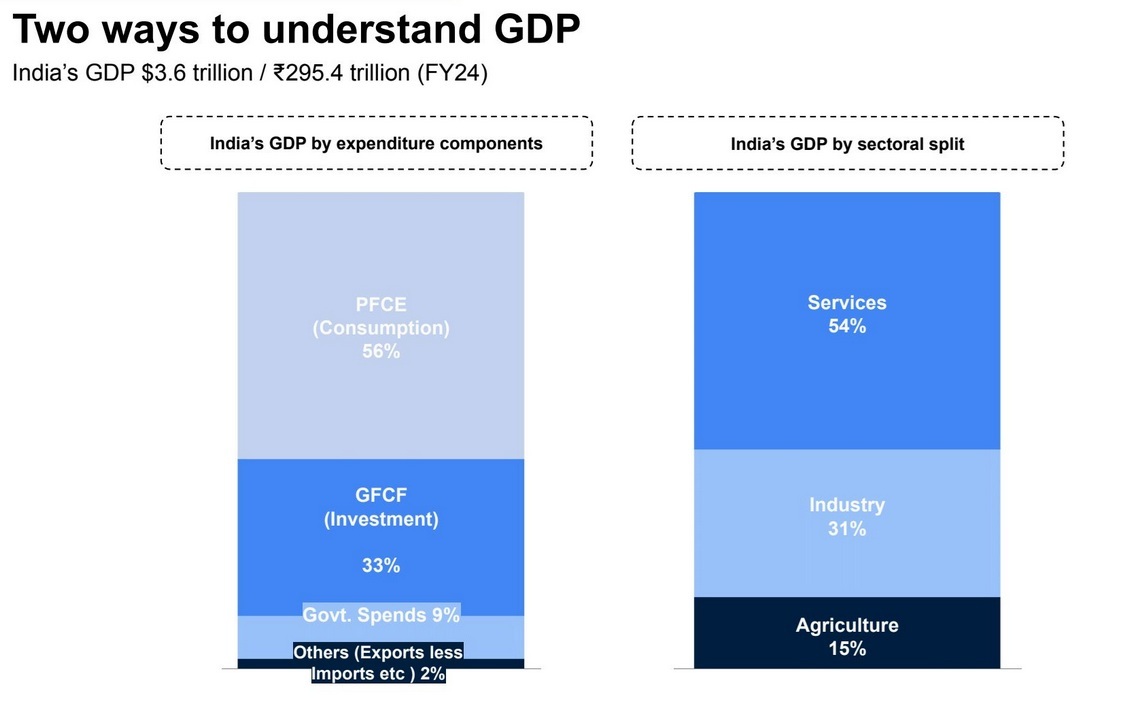 100 crore Indians--90% of population--have no money to spend on non-essential items; 10% are consuming class: Report https://www.livemint.com/news/india/100-crore-indians-have-no-money-to-spend-on-non-essential-items-report-11740593010860.html a study by venture capital firm Blume Ventures..describes aspirant consumers as "heavy consumers and reluctant payers". It highlights that industries like OTT/media, gaming, edtech, and lending are particularly relevant to this segment. The introduction of UPI and AutoPay has facilitated small-ticket transactions, encouraging greater participation from this group in the economy... wealth is becoming more concentrated. Companies are increasingly focusing on premiumisation, a strategy that emphasises high-end, expensive products tailored for wealthier consumers. This trend is evident in the booming sales of luxury homes and premium smartphones, even as budget-friendly options struggle...The report concludes that India’s GDP remains heavily dependent on consumer spending. However, unless income distribution improves, businesses may increasingly cater only to high-income groups, further marginalising a significant portion of the population.
100 crore Indians--90% of population--have no money to spend on non-essential items; 10% are consuming class: Report https://www.livemint.com/news/india/100-crore-indians-have-no-money-to-spend-on-non-essential-items-report-11740593010860.html a study by venture capital firm Blume Ventures..describes aspirant consumers as "heavy consumers and reluctant payers". It highlights that industries like OTT/media, gaming, edtech, and lending are particularly relevant to this segment. The introduction of UPI and AutoPay has facilitated small-ticket transactions, encouraging greater participation from this group in the economy... wealth is becoming more concentrated. Companies are increasingly focusing on premiumisation, a strategy that emphasises high-end, expensive products tailored for wealthier consumers. This trend is evident in the booming sales of luxury homes and premium smartphones, even as budget-friendly options struggle...The report concludes that India’s GDP remains heavily dependent on consumer spending. However, unless income distribution improves, businesses may increasingly cater only to high-income groups, further marginalising a significant portion of the population.
full report: https://docsend.com/view/pyxuqunkm9ejw38q#
Reduced to a Non-Functional Entity': Mumbai Press Club on Delay in Constitution of New Council of PCI f
The Wire Staff https://thewire.in/media/reduced-to-a-non-functional-entity-mumbai-press-club-on-delay-in-constitution-of-new-council-of-pci the Mumbai Press Club (MPC) and the Editors Guild of India (EGI). "are well known and are active in upholding the rights of the Fourth Estate. It is also significant that it was these two organisations that had taken the lead in the previous Press Council on issues such as the wrongful detention of journalists, the suppression of press persons in Jammu and Kashmir and the mass retrenchments of media personnel during the Covid-19 pandemic. Perhaps this was not appreciated in certain quarters,” said the MPC statement.
Zakia Jafri Leaves Behind a Legacy of Resilience and Quiet Dignity https://thewire.in/rights/zakia-jafri-leaves-behind-a-l egacy-of-resilience-and-quiet-dignity Teesta Setalvad Eighty-six years, the day before yesterday, when she left us, Zakia appa was 63 in 2002, no age to hear the cries she did, no age to witness what her eyes could not turn away from. ..
egacy-of-resilience-and-quiet-dignity Teesta Setalvad Eighty-six years, the day before yesterday, when she left us, Zakia appa was 63 in 2002, no age to hear the cries she did, no age to witness what her eyes could not turn away from. ..
Though there had been nothing peaceful about Jafri’spassing. The utterly stoic and adamant refusal of the Jafris to let go of their belief in the India that Ahsan sahab lived and died for, is special and rare.
Zakia appa and the Jafris turned their back on any bitterness born out of the realisation that even their neighbours had joined the mob on February 28. This is what made Zakia appa stand out with her children, as the stellar human rights defender she was... in tribute to Zakia appa, the day before yesterday, “You graced the courts, our homes and hearts. You did so with unwavering fortitude. Theirs is the loss who could not recognise the scale and magnitude of the loss for just what it was.”
Gandhi and the meaning of dharma and violence - https://www.hindustantimes.com/opinion/gandhi-and-the-meaning-of-dharma-and-violence-101738163065788.html The real Kurukshetra is inside our own mind and heart. This is why, for Gandhi, swaraj primarily meant command over our own impulses and emotions. Being free of British rule was to be a side effect of this inner-self-control, this conquest of our own anger and fears...when violence is justified on the basis of identity, of us versus them, there is a huge risk of violating the fundamentals of dharma-as-righteousness, most notably karuna/compassion and rudimentary decency.... when rage and anger generated by the frustrations of everyday life struggles, are mobilised , large numbers of people in the heat of the moment, unable to distinguish which violence is dharmic and which is adharmic.
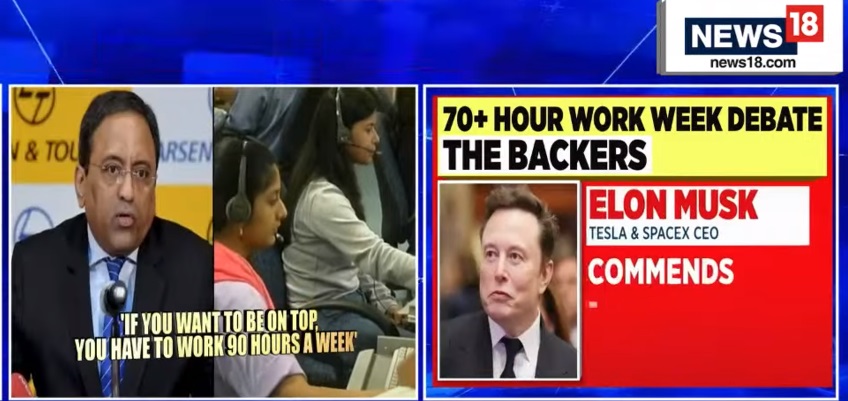 Will you work for 90 hours? https://www.youtube.com/watch?v=XkEWh8cRD9Q Ravish Kumar Official Jan 10, 2025 L&T Chairman SN Subrahmanyan Asks Employees To Work 90 Hours A Week A video of L&T Chairman SN Subrahmanyan is going viral in which he is saying that he regrets that he is not able to get people to work on Sundays. There are many memes going around on social media on his proposal to work for 90 hours a week. Actually, in the last several years, you have been reduced to sending only memes and good morning messages. There is either no job or it is low salary, inflation is at its peak and savings are going down. But you are pushing memes and blowing away every worry. All the questions have already disappeared from the media, the remaining work has been completed by the memes. Stop for a while and think how much space is there for you and your rights in such a proposal.
Will you work for 90 hours? https://www.youtube.com/watch?v=XkEWh8cRD9Q Ravish Kumar Official Jan 10, 2025 L&T Chairman SN Subrahmanyan Asks Employees To Work 90 Hours A Week A video of L&T Chairman SN Subrahmanyan is going viral in which he is saying that he regrets that he is not able to get people to work on Sundays. There are many memes going around on social media on his proposal to work for 90 hours a week. Actually, in the last several years, you have been reduced to sending only memes and good morning messages. There is either no job or it is low salary, inflation is at its peak and savings are going down. But you are pushing memes and blowing away every worry. All the questions have already disappeared from the media, the remaining work has been completed by the memes. Stop for a while and think how much space is there for you and your rights in such a proposal.
https://www.youtube.com/watch?v=po8vzTSTkmk | N18L CNN-News18 Dilip Cherian seem to be "normalising" it.. Saying that many people do work like that especially start-ups. After inviting sharp criticism for its chairman SN Subrahmanyan's idea of a 90-hour workweek, Larsen & Toubro (L&T) defended his remarks saying that 'extraordinary outcomes require extraordinary efforts'. 'We believe this is India’s decade, a time demanding collective dedication and effort to drive progress and realize our shared vision of becoming a developed nation. The Chairman’s remarks reflect this larger ambition,' the company said in a statement.
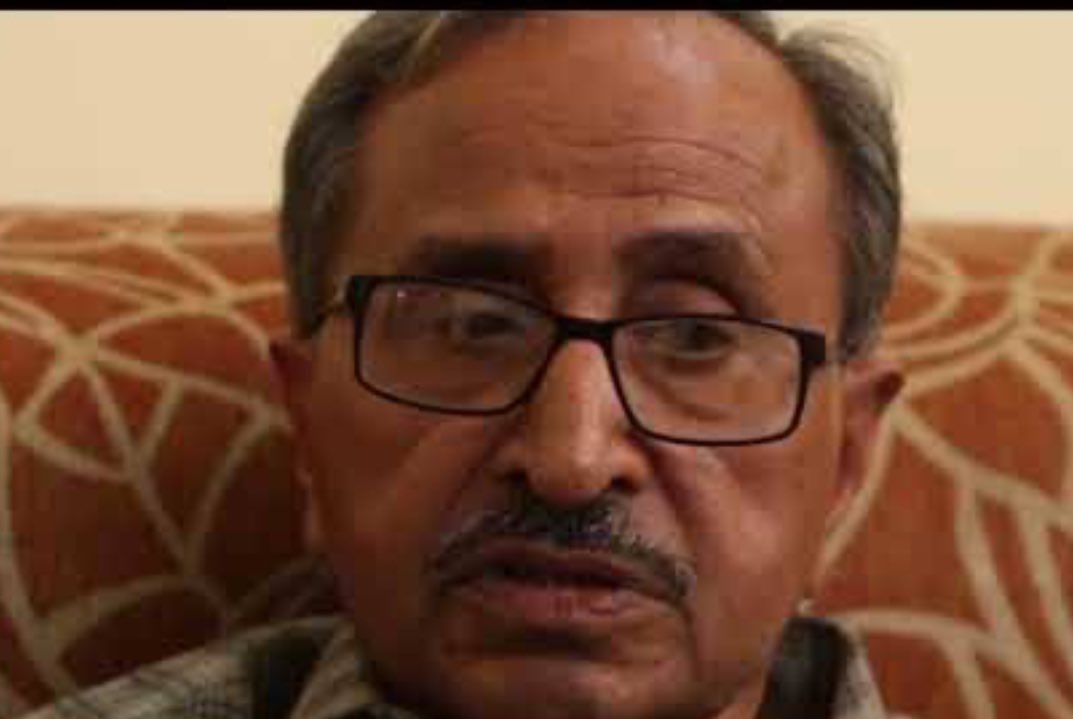
A former head of the PUCL, Ravi ji was an extremely kindred soul. He worked alongside Dr. Binayak Sen, Sudha Bharadwaj and Kavita Shrivastava in the PUCL.
When Justice Sudhir Agrawal of the Allahabad High Court, (the Ayodhya judgement case judge) wrote a letter to the Bar, suggesting that judges and senior advocates make contribution to help hapless lawyers during corona virus days, he as PUCL national president, publicly responded, saying that first this judge should give up his unnecessary Z-plus security (after the kind of judgement he had given), and secondly, he said, these days clients instead of engaging Senior Advocates prefer to engage kith and kin of Judges practicing in high court.
It embarrassed many 'uncle judges' no end.
Fond of quoting HM Seervai at length, he was the stuff the quest for justice in an unequal world is made of. No flag will fly at half mast, but his demise is nevertheless a huge loss, the kind which should be mourned in the recesses of our souls.
A lot of warriors for justice do not get the sort of headlines that some receive. Would we see gushing elegies in the papers? -- A Whats App Post.
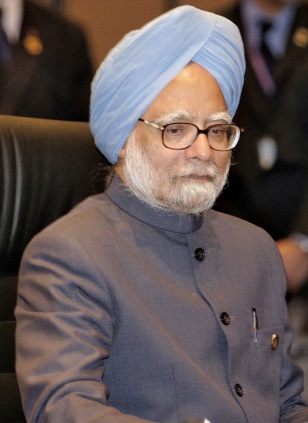 Not many people would know this: in 2004 when Manipur plunged into a deep crisis, then PM Dr MMS went to Imphal and handed over the Kangla Fort, the most revered symbol of power to the public. After independence, this was kept captive to the Assam Rifles. Here is his speech there on Nov 20, 2004. https://archivepmo.nic.in/drmanmohansingh/speech-details.php?nodeid=45 Extracts: he ancient heritage of Manipur and its tradition of bravery continue to echo throughout the length and breadth of the State and inspires the rest of the country. The Kangla Fort exemplified the bravery of Manipuris and witnessed many a fierce battle against British authorities who wanted to capture it and conquer its people. ...
Not many people would know this: in 2004 when Manipur plunged into a deep crisis, then PM Dr MMS went to Imphal and handed over the Kangla Fort, the most revered symbol of power to the public. After independence, this was kept captive to the Assam Rifles. Here is his speech there on Nov 20, 2004. https://archivepmo.nic.in/drmanmohansingh/speech-details.php?nodeid=45 Extracts: he ancient heritage of Manipur and its tradition of bravery continue to echo throughout the length and breadth of the State and inspires the rest of the country. The Kangla Fort exemplified the bravery of Manipuris and witnessed many a fierce battle against British authorities who wanted to capture it and conquer its people. ...

What kind of India do we seek? https://vikalpsangam.org/article/yogendra-yadav-writes-what-kind-of-india-do-we-seek/ Yogendra Yadav Reporting on the 10th Anniversary of Vikalp Sangam, and its session at Bhuj Nov 24.
real alternatives to modern development? Can they take on the challenge of scale and survive in the face of giant corporations in a globalised market economy? Does the practice of majority-based democracy leave any room for concerns of future generations and nature? Valid questions. But you must also ask another set of valid questions: Can anyone seriously think of offering to every Indian the lifestyle available to everyone in the Global North? Is this model worth replicating? Can we afford to go on with the destruction of nature, lives and livelihoods as an inevitable cost of “development”?
Once we recognise the unbearable weight of these questions, a quest for alternatives does not remain an obsession of a mad minority. Once we realise that alternatives are not about going back to our past, but about imagining and shaping our future, this becomes a collective search. How do we make these radical alternatives feasible? Can we think of a “scale out” rather than “scale up” model? What is the roadmap of transition from where we are to where we wish to go?
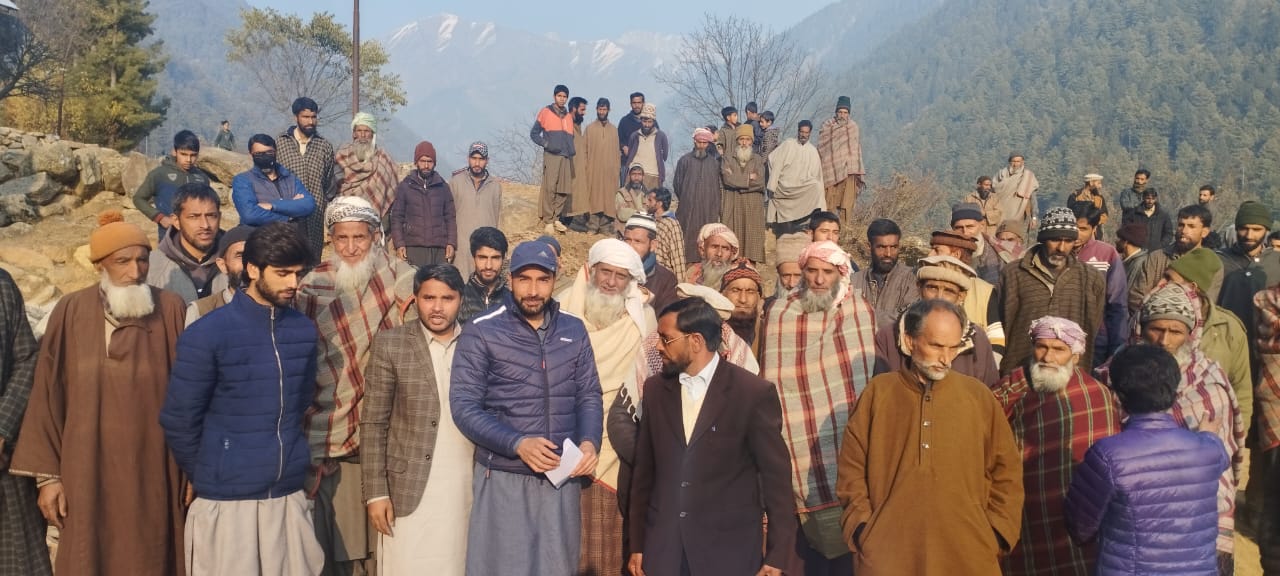
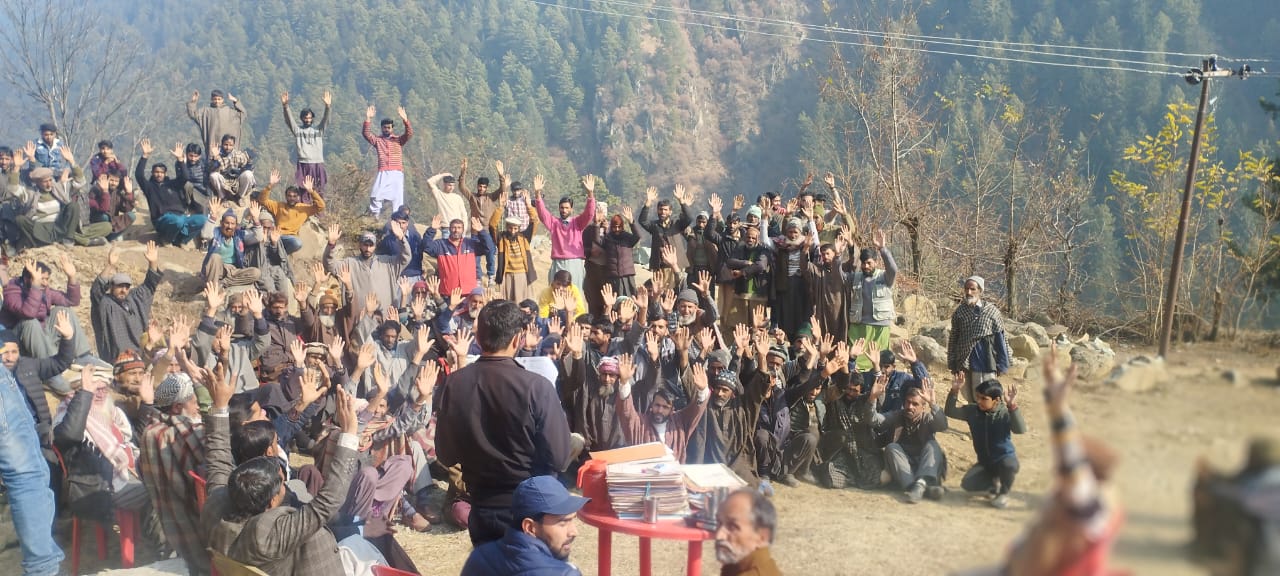 In a significant step towards empowering forest-dwelling and nomadic communities, 210 individual claim forms under the Forest Rights Act (FRA) 2006 were passed today in the Gram Sabha held at Naranag, Kangan. This milestone event underscores the growing momentum in securing the rightful access and ownership of forest resources for indigenous and pastoral communities in Jammu & Kashmir.
In a significant step towards empowering forest-dwelling and nomadic communities, 210 individual claim forms under the Forest Rights Act (FRA) 2006 were passed today in the Gram Sabha held at Naranag, Kangan. This milestone event underscores the growing momentum in securing the rightful access and ownership of forest resources for indigenous and pastoral communities in Jammu & Kashmir.
 The Right to Live Under the Grip of UAPA Eenadu 15.10-2024
The Right to Live Under the Grip of UAPA Eenadu 15.10-2024
Professor Saibaba, who languished in prison for ten years for a crime he did not commit, passed away last Saturday. With a 90% disability, he endured a hellish experience in a dark cell. He was not even allowed to see his mother one last time when she passed away.
The Bombay High Court, which determined that there was no evidence to support the charges against Saibaba, overturned his life sentence last March, describing the criminal proceedings against him as a 'judicial failure.'
- Freefall In India’s Academic Freedom Ranking Is Reflected In Cancelled Lectures At IIT Bombay & Elsewhere
- Another PM Cares?
- Solidarity with Ladakh
- Whose City is it anyway? by Amit Singh - on Jai Bhim Nagar
- Transformational Solidarity: A Dalit Feminist Viewpoint
- Ladakh Solidarity- PUCL-NAPM-VS
- For 2024, Opposition is still in the game
- Rat-hole Mining - basics
- call for a rethink on River Front Development
- Decolonize to Decarbonize: Our Call to Action for Climate Justice at COP28
- What Killed Gandhi!
- Caste, the cancer afflicting Sanatan Dharma
- G20 बनाम We20
- 3 सप्टेंबर 2023 रोजी वाढवण समुद्रकिनारीभव्य एल्गार मोर्चाचे आयोजन
- Inside Indian Energy and Mining Giant Vedanta's Campaign to Weaken Key Environmental Regulations
- Hrut Collage - Urmila Samson Homeschool
- All Those Demanding a New Constitution Are Fighting for a Less Equal India
- Gaddar, Who Symbolised Revolutionary Politics, Leaves Behind Questions on Social Transformation
- A Salute to Achyut Yagnik
- Analysing the Adani-Ambani BUSINESS EMPIRE (and its impact on you)
Page 3 of 16

